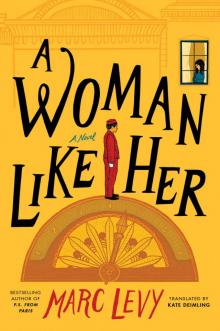A Woman Like Her Read online
Page 7
“That’s right, I did. It was a meeting with investors. I founded a company that has really grown, and I need help developing it further.”
“So you’re a businessman.”
“An entrepreneur. Are you honestly interested in my work or are you just asking to be polite?”
“To be polite. Are you based in New York?”
“In Mumbai. I built an Indian version of Facebook—one that’s much better than the original,” Sanji added proudly. “Did you get the role?”
“Yes.”
“A big role?”
“Huge! I play ten characters.”
“You’ll spend a lot of time getting into costume.”
“I act without costumes. I’m an actress, but the audience never sees me.”
“How does that work?”
“I record audiobooks. A voice with no images—the opposite of silent films, but I think there’s a poetic point of comparison between the two, don’t you?”
“I don’t know, I’ve never listened to an audiobook.”
The sky had turned gray, and a gentle rain began to trickle down the leaves of the big Chinese elm above their heads. The trumpet player put his instrument away and left. People scattered this way and that. Sanji looked up.
“Do you think it’s a sign?”
“Did you ask him another question?”
“No.”
“Then it’s just a spring rain.”
He offered to walk her home, but Chloe assured him that she didn’t need any help and would get inside before he would. Before Sanji could react, she was already at the gate. She waved goodbye and disappeared onto 5th Avenue.
7
Mr. Groomlat dug through his files searching for an old invoice. Two years ago, he had suggested that the building automate the elevator. The manufacturer had a kit that was very reasonably priced. The elevator operators’ salaries were a major expense, and eliminating them would clearly be good management, so he had been sure it would be an easy sell. This, however, turned out not to be the case. The residents were fond of the lifestyle that the old-fashioned elevator represented. Mr. Bronstein didn’t want Deepak and Mr. Rivera to lose their jobs after so many years of loyal service, and thought it would make sense to discuss it after they retired. Mrs. Williams was concerned about the prestige factor, the Clercs didn’t want the building to lose its undeniable charm, and to everyone’s surprise, Mrs. Collins flew into a terrible rage and refused to hear another word on the subject, storming out of the meeting and slamming the door behind her. Mr. Morrison had asked who would press the buttons if the elevator operators weren’t there anymore. Since no one bothered to answer, he abstained from voting. The Zeldoffs made a mental calculation of how everyone was voting and decided to join the majority. So the motion failed.
The accountant had never told anyone that he had already ordered the equipment. He had tried in vain to cancel the order and ended up skillfully disguising the expense as part of the regular building fees. When Deepak received the kit, Groomlat claimed it was a set of individual pieces that he had bought for a good price, in case the motor ever broke down, and told Deepak to store the boxes in the basement.
Mr. Rivera’s accident offered him the chance he had been waiting for. Pretty soon, the owners would no longer be able to stand climbing the stairs. In a few days’ time, there would be a veritable mutiny. He would ultimately prevail, and everyone would praise him for having planned in advance.
Groomlat was meticulous, and he wanted to ensure that the equipment was still where it was supposed to be. He took the service staircase down to the basement and crept into the storeroom.
The metal shelves were full. After exploring the back of the room, he was relieved to recognize two big boxes under a heating pipe. He pulled them out to check their contents. The kit appeared to be in mint condition. Satisfied, he hastily closed up the boxes and kicked them back into place before slipping out.
On rainy days, the marble entryway always got dirty. In the late afternoon, Deepak descended into the basement to grab the mop and bucket. He paused at the threshold of his storeroom, aware that something wasn’t right. He finally spotted the two boxes, and guessed who had opened them.
With a heavy heart, he returned upstairs to clean the lobby.
A faithful servant, he stayed at his post, patiently waiting until all the residents had gone home.
At 8:30 p.m., Deepak put on his raincoat. The wet sidewalks glistened in the dim light. He headed to Beth Israel hospital, stopping along the way to buy a box of chocolates. Scowling, he pressed the elevator button. He made his way through the hallway, asked a passing nurse for directions, and knocked on the door of Mr. Rivera’s room.
“Does it hurt?” he asked, seeing Rivera’s leg suspended in a cast.
“Only when I laugh,” Rivera replied.
Deepak placed the chocolates on the nightstand next to an old magazine.
“It’s a fine mess I’ve gotten us into.” Rivera sighed.
“It’s under control. I can stay late.”
“The doctors say I’ll be laid up for two months.”
“It’s a miracle you didn’t kill yourself in that damned staircase, so two months doesn’t sound so bad.”
Rivera sighed again.
“When they find out, they’ll fire me.”
“They’re so worried about finding someone to replace you, they aren’t even thinking about how the accident happened,” Deepak replied.
“If the insurance company gets involved, they’ll figure it out.”
“Don’t worry! I came up with a foolproof story.”
“You don’t look very confident for someone with a foolproof story.”
“You have a lot of attitude for someone in a cast up to his hip.”
There was silence. Mr. Rivera hesitated to ask the question that had been bothering him.
“In case you’re wondering, she’s very upset, but she’ll pull herself together,” Deepak said gently.
Rivera winced as he tried to sit up straighter in bed.
“Hold on, let me fluff your pillows.”
“My wife must be very upset, too.”
“I’ll go see her,” Deepak promised.
“It’s okay; you have enough trouble because of me, and besides, she won’t recognize you.”
“So she won’t even know you’re not there.”
“You know, the more I think about it, the more I wonder whether my temporary replacement should just stay on permanently …”
“Why do you feel so guilty, you idiot? Your wife has been in another world for ten years now, and you spend all your free time with her. You’ve worked your whole life, and even at your age, you’re still working like a dog. Are you trying to punish yourself for allowing yourself a bit of affection for once?”
“The thing is … I think it’s more than just a bit of affection,” Rivera stammered.
“For her or for you?”
“For both of us, I hope.”
Deepak pulled a detective novel out of his pocket and dropped it on the bed.
As Rivera picked it up, he blushed a little, and Deepak even thought he saw him smile.
A nurse marched into the room and flatly announced that visiting hours were over.
Deepak rose and put on his raincoat.
“I’ll come back tomorrow,” he said.
“You still haven’t told me why you look so glum.”
“The accountant was rooting around in the storeroom. But as I said, it’s under control, I’m not going to let them snatch away my dream …”
He stepped closer to the bed.
“Feel better, and don’t worry about anything,” he said, patting his colleague’s hand.
He nipped a chocolate from the box and left.
Deepak had decided to confide in Lali. If he waited too long, she would hold it against him. But sharing his concerns without making his wife worry was not going to be easy. Her happiness was more important to him than his
elevator and breaking records. After dinner, he asked her how her day went and also, innocently, if there were still manually operated elevators in Mumbai.
Lali knew it wasn’t an innocent question at all.
The Day I Came Back to New York
I refused to ride in the ambulance because I hate traveling by car. When I was little, as soon as we got into the car to run errands or spend the afternoon in New York, the outing turned miserable, especially for my parents. I don’t know if it was the smell of the leather, the bumpiness, or my habit of looking in the rearview mirror to see what was happening behind me, but I always had to travel with several paper bags. Mom put them on my lap before we left, and Dad had to pull over frequently to throw them out when they were full. By age five, I was not allowed to eat before getting into the car, and when I complained that I was thirsty, my parents just ignored me.
Until I turned thirteen, we never drove more than thirty miles from home. At least there was one good thing about their divorce: Mom kept the house in Connecticut (she had paid for it), and Dad and I moved to New York. No more driving! The freedom I found commuting by subway and bus was paradise.
But motion sickness wasn’t the real reason that I wouldn’t go home in an ambulance. The train was how I always got home before, and I saw no reason to change, after.
When I reached the train station, I lost my nerve. No more hospital personnel, no more strangers applauding me, only other passengers who turned to look at my wheelchair, shocked to see I was missing sixteen inches of leg, as well as my two feet. But, really, how much of a difference does it make? Sixteen inches is only 25 percent of my height. I know people who have cut off more hair than that, and who notices? Seriously, what’s 25 percent of a person?
8
The alarm went off at 5:15 a.m. Usually Deepak opened his eyes a few minutes before the alarm and turned it off so his wife could sleep in. He sorely missed his routine. And as nothing was routine anymore, Lali had already gotten out of bed.
“You’re up early,” he said when he saw her in the kitchen.
“I didn’t get a wink of sleep.”
“You should see a doctor about your insomnia,” he suggested, sipping his tea.
“It’s not a doctor I need but an elevator operator.”
“Listen, Lali. We’ve been through worse, and we’ve managed to make a nice little life for ourselves. I wish I could have given you an easier life, a more comfortable life, but I did my best. If retirement comes sooner than expected, we’ll get by. We’ll just have to count our pennies, that’s all.”
“And you listen to me, Deepak. I wouldn’t have wanted my life to be any different. I don’t intend for it to change one bit, and I certainly don’t want you to change. So, we are going to find a solution, even if I have to replace Rivera myself.”
“Don’t be ridiculous.”
“Who knows your damn Maharajas’ Express better than I do? I’ve been hearing stories about it for thirty-nine years like it’s a beloved child of yours—I can hum the sound of the regulator and the whistle of the counterweight, I can imitate the bell and the squeak of the gate when you forget to oil it. I doubt I’d need much time to learn how to operate a stupid handle.”
“It’s not that easy, actually,” replied Deepak, slightly annoyed.
He kissed Lali on the forehead and grabbed his raincoat.
“It’s much more complicated than you think,” he added as he left.
Nevertheless, as he went downstairs, he smiled at the thought that she had been willing to sacrifice her nights to help him.
Lali put on a nice outfit, looked at herself in the mirror, and left the apartment shortly after Deepak.
She exited the subway. The farmers’ market at Union Square was full of people strolling past the colorful displays of flower arrangements and organic cheeses. But Lali wasn’t there to shop—it was all out of her price range.
The Callery pear trees were scattering their white petals onto the sidewalks of 5th Avenue. Lali needed to walk for a while to put her thoughts in order and find the right words before arriving at her destination.
She stopped at 12 5th Avenue, took a deep breath for extra strength, and walked into the building with her head held high.
Deepak was closing the door of the cab he had hailed for Mrs. Williams. He immediately rushed into the lobby.
“What are you doing here? Don’t tell me you’ve got that crazy idea in your head—”
“As far as crazy ideas go, you’re really one to talk. I just came by to take a ride in your lovely elevator while I still can. You’re not going to deny me that, are you?”
Deepak hesitated, but he knew how stubborn his wife could be.
“One ride, but no more!” he grumbled.
Lali mimicked the squeaking of the gate as Deepak closed it and hummed along with the motor as the elevator ascended.
“I’m not sure why you bothered to come all this way if it’s just to mock—”
“You’d never speak that way to one of your passengers, so take me to the ninth floor, please, in silence. I want the same treatment as everyone else.”
“Fine, a round trip to the ninth floor, and then you’ll be on your way,” he said decidedly.
But on the ninth floor, Lali asked him to open the gate and went out onto the landing.
“What are you doing?” Deepak asked, annoyed.
“I want full service, so go back down to the lobby. I’ll ring for you, and you can come up and get me with as much respect as if I owned an apartment in your beautiful building.”
Deepak wondered what had gotten into her, but he closed the gate and took the elevator back down.
He waited in the lobby for a few minutes. Confused as to why the bell hadn’t rung yet, he returned anxiously to the ninth floor. He became even more anxious when he saw that his wife had disappeared from the landing.
Chloe invited Lali to sit on the sofa.
“I’m going to make us some tea. I’ll be right back.”
The idea of being waited on in a luxurious apartment was so extraordinary that Lali let her do it. She took advantage of the moment alone to admire the view.
“This is my lookout,” her hostess explained, returning with a tray balanced on her lap. “If you look from the very edge of the window, you can see the Washington Square Arch. Well, in your case, you have to bend down a bit.”
“It must be wonderful to live like this.”
“In a wheelchair?”
“That’s not what I meant.”
“Did something happen? Is Mr. Rivera doing worse?”
“No, I came here to talk about someone else, actually.”
“Deepak?”
“Your accountant, on the second floor.”
Lali told her about the kit that would toll the death knell of her husband’s career. She wasn’t sure why she had come to see Chloe. She had always managed to solve her own problems, but for the first time in her life, she felt helpless. She needed an ally on-site, someone to keep Mr. Groomlat under control while she searched for a solution. When she heard about the accountant’s plan, Chloe struggled to keep her anger in check.
“I don’t know how yet, but trust me, we’ll stop him. Trying to fire him wouldn’t work, he’d find some excuse. We have to discredit him. This can’t be his first dirty trick—maybe I could sneak into his office and look through his papers.”
“I don’t see how you could manage that.”
“Your husband has copies of the keys.”
“We have to keep Deepak out of this. He’s too honorable.”
Chloe rolled back and forth from the sofa to the window and the window to the sofa.
“I pace back and forth when I’m thinking, too,” Lali said, then added, “Oh, I’m sorry, that was insensitive of me.”
“Don’t worry about it. I’ll try to buy us some time. And I’ll talk to my father—he always has good ideas.”
“Whatever you do, don’t get Deepak mixed up in this. If he
found out that I went behind his back, he would never forgive me.”
“You could use the service stairs …”
“One accident is enough.”
Chloe accompanied Lali to the door.
The elevator arrived at the ninth floor, and Deepak provided his wife with exactly the kind of service she had requested. He didn’t speak to her or even look at her when she came into the elevator. He led her into the lobby, still without a word, and escorted her to the curb. He bade her farewell by lifting his hat and resumed his position behind the desk. As soon as he sat down, his cell phone started vibrating in his pocket.
“Another eighty-eight meters, here we go,” he said as he ascended to the ninth floor again.
Sanji and Sam walked through Times Square.
“When you really try, you’re not half bad. Your talk was so convincing, even I was on the verge of investing,” Sam exclaimed.
“On the verge isn’t good enough,” replied Sanji.
“Be patient. We still have twenty more potential investors to meet.”
“Sam, we are racing against the clock, and if I fail, I lose everything.”
Sam grabbed Sanji’s arm.
“Wait, I might have an idea. Our investors are hesitating at the idea of putting their money in India. Well, what if you opened a subsidiary in the US?”
“We don’t have enough time.”
“This is the mecca of capitalism. It’ll only take a few days to set up a company—I’ll handle it.”
“How much would it cost?”
“Just some lawyers’ fees. It’s nothing compared to what we would receive in return. But you’d have to put some money in to show that you believe in it. Five hundred thousand dollars should do it. That’s not a problem for you, right?”
Sanji thought of Chloe, and, suddenly, the idea of opening an office in New York sounded very appealing. The only problem was that his money was not readily available. The only way to obtain the necessary amount was to borrow it against some of his shares in the Mumbai Palace Hotel. Strangely enough, antagonizing his uncles no longer bothered him that much.
“Okay,” he said. “I’ll call Mumbai right away and get the numbers. I’ll have a team design an interface for the American market, and in a few hours, we’ll know what we’re dealing with.”

 P.S. From Paris (US Edition)
P.S. From Paris (US Edition) Replay
Replay The Strange Journey of Alice Pendelbury
The Strange Journey of Alice Pendelbury A Woman Like Her
A Woman Like Her All Those Things We Never Said
All Those Things We Never Said All Those Things We Never Said (US Edition)
All Those Things We Never Said (US Edition)